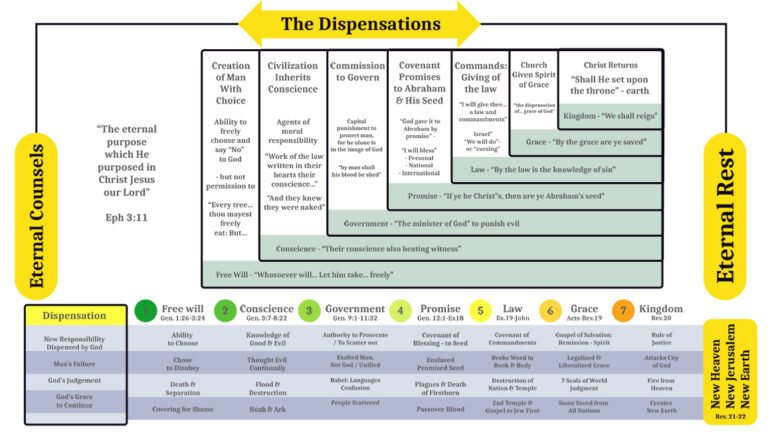The call to missionary work is a noble and sacred vocation, but before anyone responds to this call, it is important that they understand the importance of taking good care of their own household. The Word of God teaches us that a man must manage his family well, with children who obey him with all respect. After all, if someone cannot manage his own house, how can he take care of the church of God? This principle is fundamental and often overlooked in the zeal to fulfill missionary work.
The primary responsibility of a man, according to Scripture, is to love and care for his wife and children. Ephesians 5:25 reminds us: “Husbands, love your wives, just as Christ loved the church and gave himself up for her.” Christ has already given his life for the church; our role, as men, is to give our lives for our wives and our family. Often, we invert priorities, placing ministry or missionary work ahead of taking care of our home, but this does not conform to the biblical model.
True success in missionary work starts at home. A man who is not at peace with his family, who does not take good care of the emotional, spiritual, and financial needs of his own, will hardly be effective in ministry. That is why every missionary should, above all, be an entrepreneur. By being entrepreneurial, he not only secures his household’s sustenance but also demonstrates responsibility and commitment to those God has placed under his care.
Entrepreneurship, in this context, is not just a way to make money but a means of exercising responsible governance over one’s family. When a missionary is also an entrepreneur, he can provide for his home without depending solely on donations or external support, which can often be uncertain and unstable. This gives him the freedom to serve God more fully and securely, knowing his family is well taken care of.
Therefore, before embarking on any mission, a man must evaluate how his own house stands. He must be an example of leadership, love, and sacrifice at home, because that is where true ministry begins. Managing the household well is not a suggestion, but a biblical requirement for those who wish to care for God’s people. Only those who demonstrate this competency at home are truly prepared to serve in the missionary field.
I say this not to burden your life, nor out of a lack of faith, but to open the eyes of those who irresponsibly make decisions that will end their faith and leave their emotional state shaken and ill.
The apostle Paul is an example of a man who, deeply understanding his calling, decided to live in a way that maximized his productivity for the Kingdom of God. Paul chose not to marry, recognizing that for him, a celibate life allowed total dedication to his ministry and the work God entrusted to him. In his own words, he advises singles and widows that, if possible, they should remain as he is, single, so that they can serve the Lord without distractions (1 Corinthians 7:7-8). Paul understood that to fully fulfill his calling, he needed to eliminate any potential distractions that could limit his effectiveness in ministry.
However, Paul was not just a preacher and missionary; he was also an entrepreneur. In addition to his apostolic ministry, Paul worked as a tentmaker, a profession that allowed him to be self-sufficient and not be a burden to the churches he planted and strengthened. In Acts 18:3, we read that Paul met Priscilla and Aquila, a Christian couple who shared the same profession, and “because he was of the same trade, he stayed with them and worked, for they were tentmakers by trade.”
This work not only met Paul’s financial needs but also demonstrated an important principle of independence and diligence. In 1 Thessalonians 2:9, Paul reminds the Thessalonians: “Surely you remember, brothers, our toil and hardship; we worked night and day in order not to be a burden to anyone while we preached the gospel of God to you.” Here, Paul emphasizes the importance of not being a burden to the churches, exemplifying the value of hard work and self-sufficiency.
Another significant example is in Acts 20:34-35, where Paul tells the elders of the church of Ephesus: “You yourselves know that these hands of mine have supplied my own needs and the needs of my companions. In everything I did, I showed you that by this kind of hard work we must help the weak, remembering the words the Lord Jesus himself said: ‘It is more blessed to give than to receive.'” In this verse, Paul not only sustains himself but also his ministry companions while teaching the value of work as a means of helping the needy.
Paul understood that by working with his own hands, he could avoid accusations of exploitation or greed, common at the time. In 2 Thessalonians 3:8-9, he reinforces this point, stating that “we did not eat anyone’s food without paying for it. On the contrary, we worked night and day, laboring and toiling so that we would not be a burden to any of you. Not because we do not have the right to such help, but in order to offer ourselves as a model for you to imitate.”
In his life, Paul demonstrated that work is an integral part of serving God, and that financial self-sufficiency can indeed strengthen the ministry. He teaches us that while some may be called to marriage and family life, others, like him, may be called to a life of total dedication to ministry, combined with entrepreneurial work. This choice, far from diminishing his effectiveness, allowed Paul to expand the Gospel throughout the known world, planting churches, discipling leaders, and writing letters that are still fundamental to the Christian faith today.
Thus, Paul serves as a model for all those who wish to pursue a missionary or ministerial calling: the importance of balancing work and ministry, ensuring that both are in harmony for the glory of God. He reminds us that whether married or single, we all have the responsibility to manage well the gifts and resources God has given us, serving the Lord with integrity, dedication, and an entrepreneurial spirit.
In Paul’s time, the process of writing and sending letters was a complex and costly task. Writing a letter involved various costs, from the materials needed to the logistics of delivery. Writing was done on scrolls or papyri, which were expensive and difficult to produce. The ink used, made from soot or other materials, also had a significant cost. Moreover, the very writing of a letter might require the hiring of a scribe, especially if the letter needed to be written formally or if Paul was dictating the message, as is believed he did for several of his epistles (Romans 16:22 mentions Tertius as writing the letter under Paul’s dictation).
After the writing, the next challenge was ensuring the letter reached its destination. At that time, there was no public postal service as we know it today. Therefore, letters had to be delivered by messengers, who often traveled long distances and needed accompaniment to ensure security, especially if they were carrying valuable documents or important messages. The costs of transportation, food, and security during the trip could significantly increase the final cost of a letter.
It is estimated that each letter sent in Paul’s time could have a cost equivalent to £15,000 in today’s values. To understand the impact of this, consider that Paul wrote thirteen letters that are included in the New Testament: Romans, 1 Corinthians, 2 Corinthians, Galatians, Ephesians, Philippians, Colossians, 1 Thessalonians, 2 Thessalonians, 1 Timothy, 2 Timothy, Titus, and Philemon. If we apply this estimated cost to each of these letters, the total spent just for writing and sending these epistles would be approximately £195,000.
Moreover, it is important to consider that some of these letters were long and complex. The Epistle to the Romans, for example, is one of the most extensive and theologically dense, which might have increased the time and cost of production. Sending this letter from Corinth to Rome would have involved a long journey, increasing the costs with messengers and security.
Another significant example would be the correspondence with the Corinthians, where Paul sent at least four letters, of which two are lost (1 Corinthians 5:9 mentions a previous letter). The logistics of sending multiple letters to the same community would also involve recurring costs, especially if we consider that Paul likely sent trusted individuals to deliver these letters and ensure they were well received.
Beyond the letters, Paul often sent messengers who not only carried the letters but also explained them and helped resolve issues in the recipient communities. Timothy and Titus are two examples of close collaborators who frequently traveled on behalf of Paul, likely carrying these letters. The expenses to sustain these messengers, including round-trip travel, meals, accommodations, and, in some cases, even protection against thieves and road dangers, contribute to the considerable sum of communication costs.
These high costs underline Paul’s commitment to spreading the Gospel and supporting the churches he planted. Despite the financial difficulties, he considered this effort essential for the spiritual growth of the Christian communities. It also highlights the generosity of the churches that supported Paul, contributing to his ministries in various ways, including financing the expenses so that these letters could be written and delivered.
The importance of entrepreneurship and multiplying the talents God has entrusted to us is a fundamental biblical principle, reflected in several passages of Scripture. God calls us to be faithful stewards of the gifts and resources He has placed in our hands, and the parable of the talents is one of the clearest examples of this.
In Matthew 25:14-30, Jesus tells the story of a master who, before traveling far away, entrusted his possessions to his servants. To each, he gave talents according to each one’s ability: to one, he gave five talents; to another, two; and to another, one talent. When the master returned, the servants who had received five and two talents had multiplied them, doubling what had been given to them. On the other hand, the servant who received one talent, out of fear, buried it in the ground and returned it without increase. The master praised and rewarded the servants who multiplied their talents but severely reprimanded the servant who buried the talent, calling him a wicked and lazy servant.
This parable clearly illustrates God’s desire for us to be diligent and proactive in using and multiplying the resources He has given us. Entrepreneurship, in this context, is not just about starting a business or generating profit; it’s about being a good and faithful steward of the opportunities, skills, and resources God has placed in our life. God expects us to take calculated risks, investing our time, energy, and resources in actions that generate growth and bring return for His Kingdom.
Another verse that reinforces this idea is Proverbs 14:23, which says: “All hard work brings a profit, but mere talk leads only to poverty.” This teaches us that diligent effort and work are valuable in the eyes of God and that action is essential for achieving results. God blesses those who work with dedication, not just those who have good intentions, but those who effectively put their hands to the task to make things happen.
Moreover, Colossians 3:23-24 instructs us: “Whatever you do, work at it with all your heart, as working for the Lord, not for human masters, since you know that you will receive an inheritance from the Lord as a reward. It is the Lord Christ you are serving.” This verse reminds us that every work we do, whether in entrepreneurship or other areas of our lives, should be done with excellence, as if it were for God. When we undertake with this mindset, we recognize that our efforts are a form of worship and service to the Lord.
In Luke 16:10, Jesus teaches: “Whoever can be trusted with very little can also be trusted with much, and whoever is dishonest with very little will also be dishonest with much.” God watches how we manage small things and uses this to determine our ability to manage bigger things. If we are faithful in entrepreneuring and multiplying what has been given to us, He will entrust us with even more responsibilities and opportunities.
Entrepreneurship and multiplying the talents God has given us is an expression of our faithfulness and obedience to Him. By doing so, we not only honor God but also positively impact the lives around us, contributing to the advancement of His Kingdom here on Earth. May we be found faithful, multiplying what God has placed in our hands, and thus, hear the words of the Lord: “Well done, good and faithful servant! You have been faithful with a few things; I will put you in charge of many things. Enter into the joy of your master!” (Matthew 25:21).
All immigrants or missionaries will face very similar situations.

Language Barriers
The first major barrier that an immigrant or missionary faces in a new country is language. Effective communication is the foundation of any endeavor, whether negotiating with suppliers, serving customers, or understanding local regulations. Lack of fluency in the local language can turn simple tasks, such as opening a bank account or reading a contract, into real obstacles. Moreover, difficulty in communicating clearly can lead to misunderstandings that further complicate adaptation and initial success of the venture.
Cultural Differences
Another significant challenge is cultural differences. Each country has its own customs, values, and social norms that shape how business is conducted. Unawareness or misunderstanding of these differences can lead to communication failures and, in extreme cases, the failure of the venture. To build trustful relationships and adapt the business model to the specific context, a deep understanding of the local culture is essential. Without this cultural sensitivity, the missionary or immigrant runs the risk of being misunderstood or, worse, rejected by the local community.
Legal and Bureaucratic Challenges
Legal and bureaucratic systems vary widely from one country to another, representing a formidable challenge for those wishing to start a business in foreign lands. From obtaining appropriate visas to understanding labor and tax laws, the path to entrepreneurship can be fraught with legal hurdles. Bureaucracy, often complex and time-consuming, can delay the start of the business and increase initial costs, making adaptation even more difficult for missionaries and immigrants.
Networking and Contacts
Building a network of contacts is vital for the success of any venture. However, missionaries and immigrants often start with few connections in the new country. The absence of a local support network can hinder access to business opportunities, strategic partnerships, and even practical advice from other entrepreneurs. The effort required to build this network from scratch demands time, dedication, and a special ability to connect with people from different backgrounds and perspectives.
Adapting to the Local Market
Understanding the local market is crucial for the success of a venture. Missionaries and immigrants need to conduct detailed market research to identify demand, consumer preferences, and buying behavior in the new country. Without this knowledge, there is a risk of offering products or services that do not align with the needs or desires of the local market, resulting in low acceptance and sales. Adapting to the market requires a flexible approach and a willingness to adjust strategies based on feedback received from the community.
Balancing Mission and Enterprise
For missionaries, there is the additional challenge of balancing time and resources between missionary activities and the business. The demands of a new venture can be intense, and reconciling these demands with missionary work can be extremely taxing. This balance is crucial to ensure that both the mission and the enterprise are sustainable and effective in the long run. The ability to prioritize, delegate, and plan rigorously is essential for maintaining this balance.
Local Resistance and Prejudice
Immigrants and missionaries may face resistance or prejudice from the local population. This can arise from cultural stereotypes, distrust towards foreigners, or perceptions of competition. Overcoming this resistance requires sensitivity, patience, and a conscious effort to build bridges and demonstrate value to the local community. Acceptance and support from the community are crucial for the success of any venture in a new environment.
Nostalgia and Psychological Challenges
Beyond the practical challenges, there is also the emotional aspect of adapting to a new life in a foreign country. Nostalgia, isolation, and the stress of being in an unfamiliar environment can affect the mental health and well-being of the missionary or immigrant, impacting their ability to manage a business effectively. Building a new support network and seeking activities that provide emotional well-being are important steps to face these challenges.
Lack of Family and Community Support
Many missionaries and immigrants leave behind their family and community support networks when they move to a new country. The absence of this support can increase the feeling of loneliness and make the challenges of entrepreneurship even more difficult to overcome. Finding or building a new support network in the new country is essential for the well-being and success of the entrepreneur. Participating in local groups, churches, or other communities can be an effective way to build this support.
The Entrepreneurial Spirit as a Tool for Overcoming
The entrepreneurial spirit is a powerful tool for missionaries and immigrants who seek to fulfill their mission more effectively. It provides the ability to see opportunities amid challenges and to create innovative solutions for complex problems. Innovation and creativity, essential characteristics of entrepreneurship, allow the missionary or immigrant to develop unique approaches to achieve their goals, whether through social projects, sustainable businesses, or new forms of evangelization.
For example, in an environment where resources are limited, entrepreneurship can help maximize impact through the creation of micro-enterprises or social initiatives that generate income and provide direct benefits to the community. Additionally, creativity can be applied in adapting messages and methods of evangelization that resonate better with the local culture, making the mission more relevant and accessible.
Essential Entrepreneurial Skills
For a missionary to be successful in applying entrepreneurship to their mission, certain skills are fundamental. Leadership is one of them, with the ability to inspire and guide both the team and the local community being essential. An effective leader can mobilize resources, motivate people, and direct efforts towards the achievement of common goals.
Resilience is also crucial, especially in challenging contexts like a mission in foreign lands. Resilience allows the missionary to persevere in the face of cultural, economic, or social difficulties. Additionally, the ability to build and maintain a network of contacts, or networking, facilitates strategic partnerships, access to resources, and support, both from local organizations and internationally.
Innovation is another indispensable skill, as the ability to think creatively and find solutions outside the conventional is crucial for overcoming obstacles and adapting to unexpected changes. Efficient management of resources, whether time, money, or materials, is also essential to ensure the sustainability of the mission project.
But what is innovation? – it can be defined as the process of creating value in new ways, whether through the introduction of new products, services, processes, or business models, that not only meet but exceed the needs and expectations of customers. In the entrepreneurial environment, to innovate means to identify opportunities for improvement or change and transform those opportunities into practical and effective solutions that generate a positive impact, differentiate the company in the market, and create competitive advantages. Innovation is, therefore, the engine that drives growth, adaptation, and the sustainability of a business in a constantly evolving market.
Intercultural Communication
Intercultural communication is a competency that can determine the success or failure of a mission. Understanding and respecting cultural differences, while communicating effectively, is essential for building solid relationships and for the acceptance of the mission by the local community.
Identifying Opportunities in New Cultural Contexts
Identifying business opportunities in a culturally distinct environment requires a combination of attentive observation, research, and engagement with the local community. Conducting studies to understand the needs, desires, and gaps in the local market is essential. This can include informal conversations, structured surveys, and the analysis of economic and social trends.
Cultural immersion, actively participating in the daily life of the community, helps understand its dynamics, identify problems that can be solved, and perceive opportunities that are not obvious at first glance. Collaborating with community leaders and local entrepreneurs can provide valuable insights and open doors to new opportunities. Implementing small pilot projects to test the acceptance of new ideas and adjust the business model before scaling it up is a smart strategy to minimize risks.





















